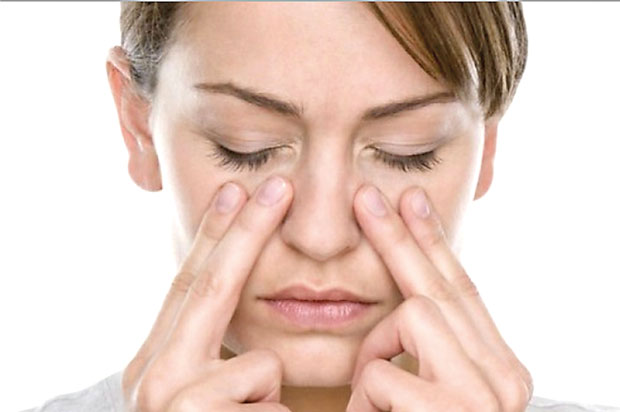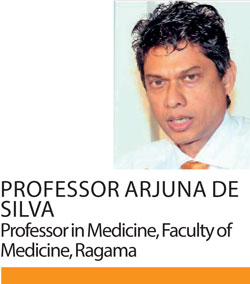01 Sep 2017 - {{hitsCtrl.values.hits}}

 No, it doesn’t have anything to do with rhinos. But Rhinosinusitis does have something to do with you getting a stuffy nose and a dull headache. We Sri Lankans always fall susceptible to such symptoms in the sometimes dusty, sometimes cold environment. Rhinosinusitis, more commonly known as sinusitis, is a general problem that a lot of people fall victim to. Professor Arjuna De Silva, Professor in Medicine, Faculty of Medicine, Ragama provided an insight on the rampaging common medical malady known to man as ‘Rhinosinusitis.’
No, it doesn’t have anything to do with rhinos. But Rhinosinusitis does have something to do with you getting a stuffy nose and a dull headache. We Sri Lankans always fall susceptible to such symptoms in the sometimes dusty, sometimes cold environment. Rhinosinusitis, more commonly known as sinusitis, is a general problem that a lot of people fall victim to. Professor Arjuna De Silva, Professor in Medicine, Faculty of Medicine, Ragama provided an insight on the rampaging common medical malady known to man as ‘Rhinosinusitis.’
Sinuses 
Professor De Silva explained what sinuses are. “Sinuses are small air filled cavities in the skull that are connected to the nose. Sinuses are lined by cells that produce mucous. The mucous produced by the sinuses is drained by small channels to the nose,”he said.
Definition
When a person contracts sinusitis, the channels connected to the nose from the sinuses are blocked. This condition leads to the inflammation and irritation of the linings of the sinuses,hence causing sinusitis.
Causes
Professor De Silva listed the causes for rhinosinusitis. It is mainly caused by infections, allergies, air pollution.“Allergies to pollen and dust are more likely to cause sinusitis. Viral and bacterial infections also cause sinusitis,” explained De Silva. A general fact is the change that takes place in the environment that surrounds us. What happens is different to what happens in other countries.
According to the professor, our surrounding conditions change from dusty to cold and vice versa. This triggers sinusitis more often. That is why sinusitis is common in Sri Lankans, especially in those who live in dusty environments where more mucous is secreted.
Signs and symptoms
There are common tell-tale signs that suggest you have contracted sinusitis. “These include thick nasal mucous and phlegm, a blocked nose and heaviness of the head,” explained professor De Silva. Other signs include a dull headache, fever, cough, sore throats or even poor sense of smell due to a blocked nose.
Diagnosis
“Sinusitis can be clinically diagnosed by an ENT specialist. If it’s severe, x-rays are also taken to diagnose sinusitis. In more serious and aggravated conditions of sinusitis, a naso- endoscopy is also performed.” the professor stated.
Treatment
Generally patients will be asked to avoid allergants that trigger their allergies. “Nasal drops are prescribed to relieve nasal blockage. In the case of a bacterial infection, the condition is diagnosed by a doctor and unless the condition is severe, antibiotics aren’t usually prescribed,”stressed De Silva. Painkillers are also said to be prescribed to avoid headaches that a patient experiences when suffering from clogged up sinuses.
Prevention
“Avoiding triggering factors that stimulate and arouse one’s allergies is important to be kept in mind,” accentuated Professor De Silva. Therefore it’s necessary to avoid dust and other factors that cause allergies. Some cases of sinusitis can be prevented by maintaining proper health hygiene such as one’s washing hands. Avoiding smoking is also an important step to avoid contracting rhinosinusitis.The rapid switch from one kind of environment to another such as from dusty conditions to air conditioned conditions is also of concern and should be minimized as much as possible in keeping rhinosinusitis at arm’s length.
23 Dec 2024 2 hours ago
23 Dec 2024 3 hours ago
23 Dec 2024 6 hours ago
23 Dec 2024 7 hours ago